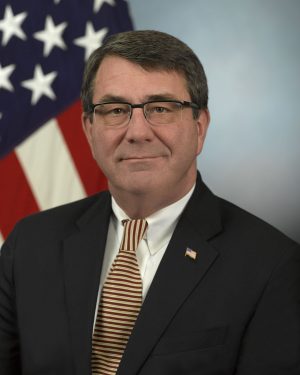At a confirmation hearing before the U.S. Senate last week, Ash Carter, the Obama administration’s pick to replace Chuck Hagel as U.S. secretary of defense, told lawmakers that he wouldn’t be pushed around as defense secretary. Carter, a wonkish thinker on defense and security, is likely to stick to his word and contradict the White House on important matters of policy. Carter, in some ways, risks inviting the same sort of isolation Chuck Hagel faced within the cabinet. However, where previous defense secretaries may have eventually rubber-stamped White House initiatives, Carter will be one to push back. As one former White House official told POLITICO’s Michael Crowley, Carter is “arrogant and doesn’t suffer fools gladly.”
U.S. Senator John McCain (R-AZ), however, is skeptical of Carter’s posturing. “I’m confident that he has no influence whatsoever,” McCain, who chairs the Senate Armed Services Committee, told the press. McCain remained unconvinced by Carter’s affirmative answer to the question: “If security conditions on the ground in Afghanistan degrade in 2016, would you consider recommending to the president revisions to the size and pace of the drawdown plan announced by the president in order to adequately address those security conditions?” McCain notes, “All of the decisions are made by three or four people at the White House level” — a group involving the president, the national security adviser, and occasionally a coterie of senior intelligence officials.
Carter’s relationship with the White House, in his own words, would not be adversarial. Instead, he cautions that he would offer the White House his educated counsel on matters of defense and security, even if that advice contradicts the White House’s short- and medium-term plans and involves accepting premises that are politically unpopular. “I have promised President Obama that if I am confirmed, I will furnish him my most candid strategic advice,” Carter told the hearing committee last week. “I will also ensure that the president receives candid professional military advice. This is not only consonant with the law as written in this very committee, but with good sense, since our military leaders possess wide and deep experience and expertise.”
Going by his confirmation hearing last week, Carter seems poised to enter office at the Pentagon as the sort of philosopher-king that Chuck Hagel and even Robert Gates failed to be. Hagel, particularly, had a shaky showing before the Senate during his confirmation hearing — a performance that failed to convince even senior members of the administration he was about to enter. Carter’s candidness and reputation as an outspoken defense intellectual should add much needed vim and vigor to the White House’s approach to international crises from Eastern Europe to the Middle East.
Carter, in his hearing, seems to have also won over the administration’s critics across the aisle. Activist Republicans, eager to see the United States’ military shed its tempered passivity amid growing challenges the world over, see Carter as a continuing believer in the utility of American hard power. In particular, Carter’s comments on the United States’ constrained defense budget will likely impress Republicans of John McCain’s ilk. (Carter’s hearing took place in the wake of the Obama administration’s 2016 budget request to Congress — Carter criticized the base budget’s defense allocation, stating that the $534 billion earmarked for the Pentagon would make current U.S. strategy “not executable.”) Still, Democrats pushed back at suggestions that Carter would emerge as a thorn in the White House’s side. “[Republicans] have to understand — he’s going to be working for the White House and the president,” Senator Joe Manchin (D-WV) told reporters during the hearing.
In the end, Carter might be exactly the sort of defense secretary this administration needs. Obama’s team is already in its penultimate year, with muted sway over Congress following last fall’s midterms. Carter’s broad bipartisan appeal might ultimately play an important part in helping the White House swing a deal with Congressional Republicans, allowing for an arguably necessary increase in defense spending. The administration’s critics on the Hill, despite their misgivings with the president, might buy Carter’s pitch on important national security issues.
Time will tell if Carter will shrivel into a reluctant rubber-stamper as other defense secretaries have in the past. Something tells me he’ll likely resist that fate. Will U.S. national security and interests be all the better for it? We’ll find out in due time.

































